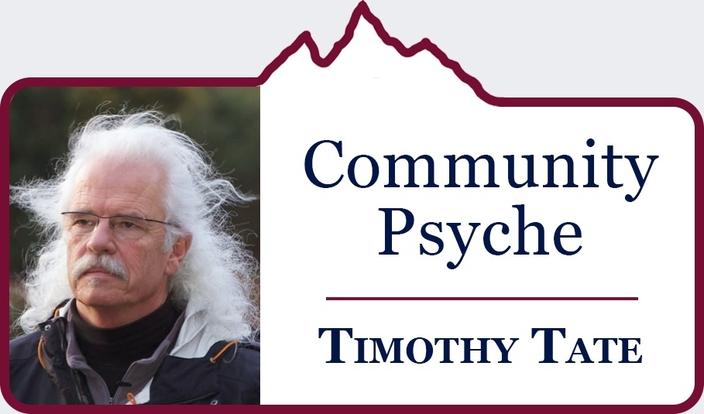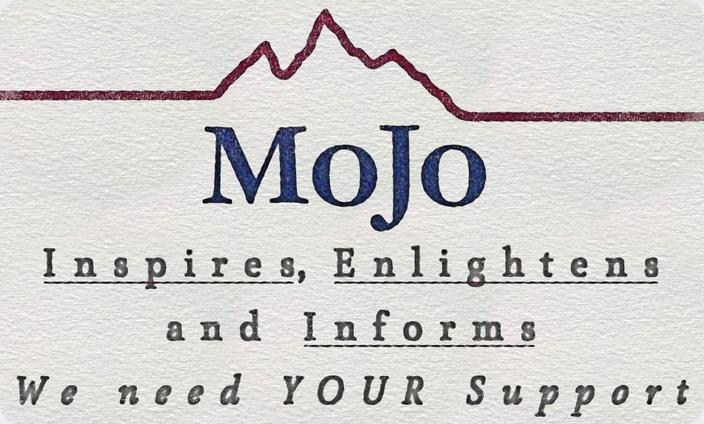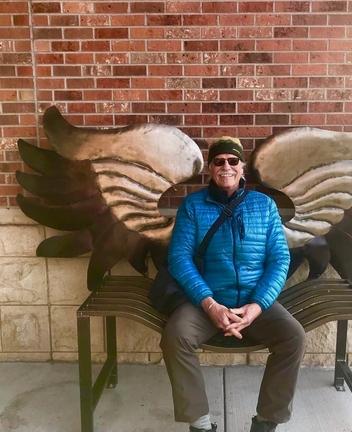Back to StoriesThe Midlife Crisis Trilogy: To Live Or Die
December 28, 2017
The Midlife Crisis Trilogy: To Live Or DieIn The Conclusion Of Timothy Tate's series "When Peter Pan Enters Middle Age", Walt Faces His Moment Of Truth
Walt remained standoffish.
As a psychotherapist, you never know, for
sure, which path a client will take when they reach the point where they
have nowhere else to go but inward. I’ve seen people achieve radical
transformation and I have seen journeys end in unspeakable tragedy. We’ll
discuss more of those later.
My role is never to manipulate. Inner discovery, if it is possible, if it
ever happens, occurs on the client’s own terms. I have counseled plenty of men
in crisis. And I have received the phone call in the dead of night from law
enforcement notifying me that a terminal end had come.
Walt flashed belligerence when I asked him not
what his opinions were, or what he
was thinking, but what he was feeling. Not wanting to go there, he
kept reminding me he felt our therapy sessions were a waste of his time.
Being pissed off, getting angry to the point of
violence, yelling, ranting, bullying, intimidating is not the kind of feeling I am talking about.
A lot of men, by the time they reach middle
age, have all but forgotten how to express what they truly feel.
Feeling means blasting away the armored shell;
it means being vulnerable. We are hard-wired, it seems, against letting our
guard down.
Most of my female clients understand this
distinction, but for men it is often difficult to distinguish the difference. Feelings, we are told, are for wusses, not
warriors. Over time we come to believe
that if we don’t need to rely on anyone else, we make ourselves impervious to
being hurt by others. We push through
physical pain and in various forms of aholisms—alcohol, drugs, pornographia,
work and play—we deaden the anxiety
of trying to outrun our mortality and sense of not feeling good enough.
And yet, most men I know have intimate relations
with other men in which they lower their spears through bro-dom. Intimacy takes
many forms well beyond society’s fixation on the sexual connotations of the
word.
Many women, who yearn to be close to their partners,
if those partners are men, often fail to understand that within the holy
brotherhood of masculinity, intimacy exists in the hunt in the woods, in the
climb up the mountain, in the heat of the sweat lodge and in myriad other ways
not always visible to the female persuasion.
But this doesn’t mean menfolk are not epically
dysfunctional, because what we really want is connection. Our dysfunction is
often found in self-indulgence, a belief in our own invincibility, and, in many
mountain towns where Peter Pans flaunt their toys, the refusal to grow up. It
is the inability to shed the machismo of self-focus that is the façade of many
men of the peaks and dales, and it’s what gets many of us into trouble and
depression in midlife.
° ° °
My time together with Walt wasn’t going
anywhere. During our next meeting, I greeted him at The Blue Door of my
consulting room, knowing that his court-ordered visits would soon be drawing to
a close. At that point, I would pass
along a report to the court, saying Walt had showed up as he said he would, and
the judge might grant clemency. Both the
judge and I would know though, having seen this pattern many times before, that
it might not be the last time Walt gets into trouble.
But you can’t force a person to embrace
therapy.
On this afternoon, like all the previous
afternoons we had spent together, Walt does not look me in the eye. His attitude
is brusque, his gaze lowered. He slides onto the couch like a storm cloud casts
a shadow. And then he lifted his head and stared at me with defiance.
I can tell by the absence of light in Walt’s eyes that he is telling me the unvarnished truth. He isn’t merely expressing a sense of abandonment but that he is ready to abandon the will to live.
I get an uneasy feeling, a pit in my stomach,
when a man looks at me like a fugitive who, having missed the boat, is now
stranded on the dock, alone, actually pondering giving up.
I know Walt is in serious trouble.
I sit without speaking. A tension builds.
After several minutes, he says: “You know what? This isn’t working for me.”
He casually mentions that he’s started
drinking again, and that he and his partner had split. “She said I had become
too much of an asshole and being around me depressed her.”
I can tell by the absence of light in Walt’s
eyes that he is telling me the unvarnished truth. He isn’t merely expressing a sense of
abandonment but that he is ready to abandon the will to live.
° ° °
Yes, there are moments in the relationship
between every therapist and client on which details, developments, trust and
confession turn.
Walt breaks down.
“I don’t know what to do. I don’t know how I
got here,” he said, followed by a long pause.
“It’s so f-ed up. Everything’s broken and I
don’t know how to fix it,” he continued.
“And here’s the deal. I’m at the point where I don’t really give a shit.
This isn’t how I thought my life would be when I moved here.”
When was that? I ask.
“More than 30 years ago.”
What happened?
“I don’t know.”
He lets on that when he came to Bozeman, he
thought it would be a fun place to play and that he figured he’d move on to a
city. He’d had friends do that. Some left and became frustrated with jobs,
families and kids. Others did not. Some
returned to Bozeman and his friendships with the guys faded as they got
distracted by other things.
Walt thought he was being clever by, wherever
possible, getting paid in cash to avoid taxes, and he figured that as long as
he stayed fit and ski patrolled he’d never need health insurance or retirement
benefits. When he refused to get tied down with commitment, a couple of women
he’d been involved with got frustrated and left him for guys he thought were
his inferior.
And this left him bitter.
Sharing these details, Walt becomes agitated,
rubbing his hands and forehead. He suddenly jumps up and paces around the room
talking louder—how frustrated and angry he is; how unfair it is to be him.
Mostly, I listen; I’ve heard different
iterations before.
He is venting now with startling clarity: how
his body aches from old skiing accidents, how strapped for money he is, and he
rails against the monotony of his mandatory drug and alcohol classes
Sitting back down, slouching on the couch, he
quietly, with a reserved voice now, says: “Not really sure it’s worth it.”
“What’s not worth it?” I ask.
“Life.”
“I used to be so goddamned tough,” he says,
explaining that he feels defeated, desperate, and, at age 55, alone.
° ° °
The early winter light was fading outside,
creating a subdued, closed-in ambiance. I personally struggle with our early
onset seasonal darkness for the first few weeks in December.
I sensed that Walt did as well. It’s as if
Seasonal Affective Disorder (SAD) slips in under the late autumn radar,
compelling a fall into the darkness of a moody, dispirited state, even for the
well-adjusted.
Walt was in a very black place, more colorless than that.
I strongly believe in the biblical adage of
“Physician, heal thyself” as a principle for effective psychotherapy. So the
tools I have as a therapist to manage my own autumnal struggles equip me with a
sensitivity to Walt’s downcast face.
The trouble Walt is experiencing is way beyond
the pressures of a dark winter season, though. It is the trouble that a man
faces when he truly doesn't’ know what to do anymore. Bagging peaks, assessing one's virtue based on body image or resume of feats, just doesn't do it.
Men know how to fix things, a binding that
comes loose, a chain wrapped around the gears, a sprained ankle in the
backcountry. In mental health, however, there is nothing to “fix” within
ourselves, only a change of attitude about what the perceived problem is. It isn’t as simple as a prescription you take
for a couple of weeks and a quick return to “normal”, because the old “normal”
is what led to the need for therapy.
The challenge is, if a man can’t fix what’s
wrong or figure out what to do he can feel helpless and ashamed and ultimately
worthless. Once a man feels inadequate he is at war with life in a way that can
end tragically.
The challenge is, if a man can’t fix what’s wrong or figure out what to do he can feel helpless and ashamed and ultimately worthless. Once a man feels inadequate he is at war with life in a way that can end tragically.
“Let’s back up here, Walt,” I say.
I ask him to recount how he had felt
throughout the past week. Walt expressed
how the requirements for meeting the mandatory conditions of his DUI were a
pain in the ass. He spoke indignantly
about Alcoholics Anonymous. Sitting in a therapy group with “losers” was wearing
him down. The A.A. meetings he was required to attend seemed like emotional
echo chambers that all sounded the same refrain: “keep coming back, it works if
you work it.” What the hell does that mean anyways? He did like the smoke breaks though, and the
coffee and doughnuts were okay.
° ° °
Anger and depression are flip sides of the
same coin. Depression is sometimes manifested as internalized rage whereas rage
is an uncensored expression of unresolved existential sadness.
In Roman mythology there was Janus (god of
transitions and duality) and in modern times we’ve discovered that moodiness is
the genetic or biological root system of depression. Sometimes things run in
the family and we are inheritors.
As a clinician my most challenging task is to correctly
assess the difference between bio-chemical sources of depression and its
emotional or psychological forms. There is such a subtle confluence of these
sources that it might seem to be an academic distinction.
The difference though for Walt was that self-medicating
with marijuana and alcohol failed to address his genetic predisposition to
depression, while his death defying acts on the mountain failed to compensate
for his unattended inner darkness. No matter
how far or fast he may go, his inner demons would always come along for the
ride.
° ° °
I shared with Walt that dreams, reading, and
creativity are ways to get past our own convictions. That his challenge is to
respect that inner work is as exciting and challenging as “sending it” is on the
mountain. In other words the hero's journey, for a man like Walt, is to go
beyond where his father could emotionally, to break family cycles. To do so
requires that Walt take full responsibility for his life circumstances. There
are no excuses for misery.
The only way that change can happen is if we change.
° ° °
Our sessions didn’t end when the court order
did. We found a way to make them continue and eventually, with each one, he
shared more of his story. He became
curious about me.
“Tell me, and don’t give me any bullshit
psycho-babble, but what keeps you going?” he asked.
“My sense of meaning comes from several
sources: my marriage, my children and grandchildren, my professional work,
music, and nature. But even those connections don’t touch my dark night of the
soul. There are times when I withdraw into a darkness that nothing can touch.
Our work, the work that each of us takes on, is to believe there’s a way out
and hone our instincts for finding it.”
It is at these times when a man can’t be
reassured or saved. Different than women who know the depth of life within
their bodies, cycles of change, and the potential of carrying life, men can
isolate so effectively that there seems to be no way out.
Once the ability to experience the
exhilarating forces of climbing, extreme skiing or whitewater rafting are no
longer viable options for that feeling of visceral vitality, what is a man to
do?
The same strength, determination and resolve
that was once used to achieve physical feats of grandeur must be summoned to
hold steady in the tumult of the inner world.
If a man does not collapse into despair, he may near the edge of his soul‘s abyss and discover a reason to see another sunrise. It requires getting
to know himself.
Change literally is born one step at a time.
Walt and I slowly over months move into discussing
the mysteries that he formerly held at bay—his own personal weaknesses and
failings that he refused to acknowledge. He realized the world did not end when he did so and
that he could laugh at himself.
Ironically, as Walt lightened up, he became
more responsible; he stopped drinking and medicating himself; he started
volunteering for a well-known community cause and there he met a lady friend.
The two fell in love. She had no idea what Walt had been through, but he didn’t
conceal it and she said it didn’t matter. She liked a man who was brave enough to be emotionally vulnerable.
There is a moment in therapy when it occurs to
the person I serve like Walt, that we are not sentenced to a life of
depression, anxiety or despair. That our biochemical dictates or family of
origin wounds may be convincing, but creativity means that we take the raw
material we have been given and convert that into a story we compose, not
simply recite. This is our liberation and I believe much of it has to do with empathy.
For Walt that meant accessing an enthusiasm
for meaningful conversation with a male elder despite his initial misgivings.
Our sessions take on the sheen of cooperation harkening back to the days of old,
where the warrior, fresh from defeat on the hunt, garners courage and insight
from the light of the campfire and the encouragement of a tested elder.
Walt is out there amongst us; there are
actually many Walts who choose change and find meaning with inward reflection.
POSTSCRIPT:
I take solace in the ancient ritual of
welcoming the return of the light on this side of the Winter Solstice as we
head together into a new year. May I extend to our Mountain Journal family a
heartfelt wish to remember that no matter how dark and cold the inner night
might seem, the light does return. And while we wait patiently for its return, make
certain that those you love are meeting your gaze, that you hold them with your
eyes and arms, and together in community, we find our way home.






